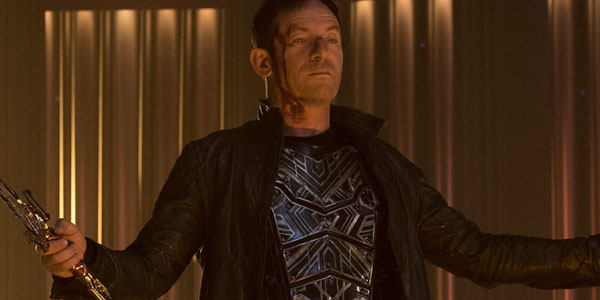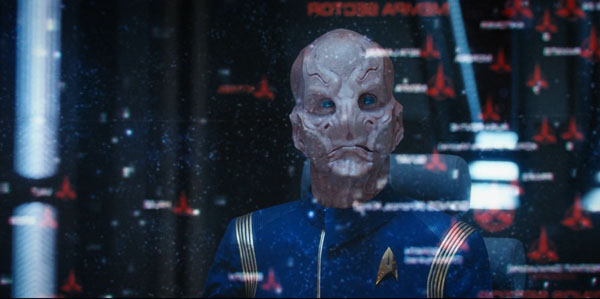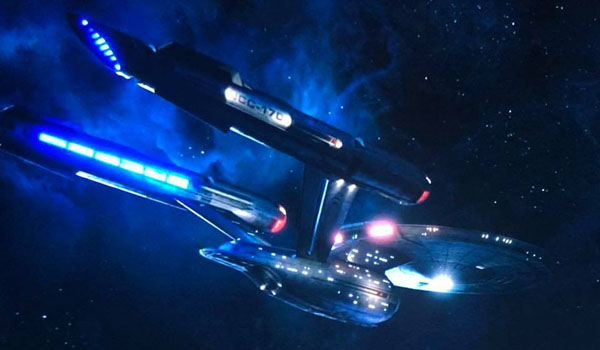
Josh Reviews the Final Season One Episodes of Star Trek: Discovery
Well, Star Trek: Discovery has wrapped up its first season. What did I think of this final run of episodes?
What’s Past is Prologue — This conclusion to the extended Mirror Universe string of episodes was a high-point of the season for me. I think it’s crazy that this show — theoretically designed to broaden the appeal of Star Trek and attract new fans to the franchise — has wound up spending such a long time in the Mirror Universe (which seems designed to please long-time Trek fans but befuddle newbies), but if you put that baggage aside, this multi-episode romp in the Mirror Universe has been a hoot, and things got even crazier and more fun in this episode. With Lorca revealed as a Mirror Universe baddie, this episode careened from one juicy action sequence to the next, as Burnham and the Mirror Georgiou fight for their lives on the run from Lorca and his goons.
The episode looked gorgeous. It was filled with a number of beautifully designed unusual shots (director Olatunde Osunsanmi did a terrific job) which highlighted the show’s production values. The sets, the props, the costumes, everything looked great. (Totally wrong for this prequel era of Star Trek, but if you can put that aside…) And the outer-space visual effects were magnificent, as we finally got a truly great Discovery space-ship action scene as the Discovery attempted to attack and destroy the Empress’ enormous city-ship, the Charon. Great stuff.
I loved seeing Landry (Rekha Sharma), who was originally killed off way too early and stupidly, back on the show. I loved seeing Georgiou (Michelle Yeoh) again, and I enjoyed the interplay between her and Burnham. These are two great, strong female characters. I loved seeing how competent and effective Saru was, in command of the Discovery. I liked the idea that Mirror Lorca wound up in the Prime universe via a transporter accident during an ion storm, the same as happened with Kirk & co. in “Mirror, Mirror.” (And I appreciated that the show actually showed us a glimpse of an ion storm, though I wish that had looked a little cooler.)
It was interesting that Voq/Ash was absent from this episode. I was surprised that was the case, after all the buildup, but I didn’t miss him in all this Mirror Universe fun craziness.
I’m not sure I understand the nature of the threat to the mycelial network, or why the destruction of this network would destroy all life across the multiple universes. I wish that had been fleshed out more. But again, in the short term, I didn’t mind that too much in the midst of all this Mirror Universe fun stuff.
My only real objection to this episode was the ease by which Lorca was dispatched at the end. This character had spent years plotting to return to the Mirror Universe — and we the audience had spent this entire season following his journey — and he was undone far too easily to suit me. If this is truly the last we’ll see of Lorca, it feels like an anticlimactic ending to this character after all the build-up. (Though I guess the Prime universe Lorca is still out there somewhere, right?) I will say that I did enjoy Mirror Lorca’s spectacular, fiery end.
When Stamets reported that the Discovery had overshot their timeframe when they returned to their universe, I was hoping very strongly that he’d say that they had zoomed hundreds of years ahead, into a post-TNG era which is where this show should have been set all along. But instead, they’re just a few months ahead, and in that time, the Klingons have apparently conquered most of the Federation. Once again I ask, can this possibly all be happening in the “Prime” Star Trek timeline?? I suppose it’s possible, it just seems unlikely. (Even assuming the Discovery & co. are able to push the Klingons back and defeat them, the peaceful Federation of Kirk’s era doesn’t feel like a civilization that had only recently been almost conquered and destroyed by the Klingons…)
One last comment on the Mirror Universe: after including that mention of the original U.S.S. Defiant a few episodes ago, I was surprised we didn’t get to actually see that ship. That would have been cool. Why even mention the Defiant if we weren’t going to get to see it…?
The War Without, The War Within — This episode is a bit of a step back after the strong “What’s Past is Prologue.”
After ignoring it in the previous episode, the show returned to the Voq/Ash storyline. I am mixed on how things played out here. On the one hand, there are a lot of interesting ideas that could be explored (the use of the phrase “reassignment” carries with it weighty connotations), and I liked the way Ash approaches his situation. He doesn’t hide away in his quarters, and he goes out of his way to offer unreserved apologies to Stamets and Burnham for his behavior as Voq, without whining that it wasn’t really him who did those things. On the other hand, I never really invested in the Voq-Burnham relationship, so what is supposed to be heartbreaking falls flat to me. And it seems too easy that Ash is back to himself and Voq is totally gone. What was the point of all the time we spent with the Voq character in the early part of the season?? This all seems to have gone nowhere. I did love seeing the way Tilly refuses to ignore or shun Ash. Tilly has really developed into a fantastic character, and it was great seeing her and some of her comrades acting like true Starfleet officers and being willing to forgive Ash for his actions as Voq.
I enjoyed seeing Admiral Cornwell and Sarek back involved in the story. I liked that the episode acknowledged Cornwell and L’Rell’s connection from back when Cornwell was being held prisoner by the Klingons, though I wish it felt like the show had a better idea what to do with L’Rell other than keep her in that cell.
In what is a “shock” reveal, we see that the Klingons have destroyed Starbase One. But the show never really clarified the context of that. Were all the top Starflet brass on that starbase? (That’d have been pretty silly during a time of war.) I’d assume that something called Starbase One was in Earth orbit, or super-close to Earth, but for some reason the Klingons didn’t keep going and destroy or conquer Earth? Why the heck not? And why is the show so vague about where Starbase One is? (It’s like the show assumes we’ll know what it is and understand that its destruction is a Really Big Deal, but they didn’t lay any of the groundwork for that.)
That Sarek performs a mind-meld on Saru without Saru’s consent was shocking for me, and completely out of character for Sarek. (Yes, we saw Spock do this occasionally, but 1) only under far more desperate circumstances than these, and 2) Sarek is not Spock, and that Sarek would do this felt like a complete betrayal of everything we knew about this character.) I was also bummed to hear that the Mirror Discovery had been destroyed by the Klingons off-screen after it had been transported to the Prime universe. That feels like a far-too-easy way out of a hole the writers had written themselves into.
On the other hand, for a show that has been so dismissive of Star Trek continuity, I was pleasantly surprised by the direct reference to Captain Archer and the NX Enterprise’s visit to the Klingon homeward in the Enterprise premiere, “Broken Bow.”
We hear that Starfleet is keeping the existence of the Mirror Universe classified, which explains why its discovery is a surprise to Kirk & co. in “Mirror, Mirror.” I appreciate this nod to continuity, but I have little patience for this. This sort of hand-waving everything away is one more reason why this show should never have been set in this prequel era. Had the show been set after TNG as it should have been, they could have had all the fun in the Mirror Universe they wanted, without needing any of this silly exposition trying to put the genie back in the bottle!!
The ending, in which Cornwell announces that Mirror Georgiou has been given command of the Discovery, was ludicrous. Oy vey, that’s obviously a horrible idea to allow this evil character command of a starship. So silly.
Will You Take My Hand? — For a season finale that depicted a race against the clock to prevent the annihilation of the Federation, this episode was rather leisurely paced. It was, in my mind, a near-total fail at maintaining dramatic tension. But I have to confess, I rather enjoyed the scenes of the Landing Party goofing around on Qo’noS. Those scenes — including Tilly getting high with an Orion played by Clint Howard (a wonderful guest-star, as he had appeared as the alien Balok way back in the Original Series episode “The Corbomite Maneuver”!), Georgiou making sexy-time with two Orion sex-workers, and Ash laughing and snarling while playing some sort of Klingon gambling game — were loose and fun and show that Discovery has all the elements it needs to work. These actors are great, and while there have been some stumbles, all of the main characters have developed, at this point, to be quite an interesting group. I loved these moments of watching them play.
But boy, the larger story around them just stinks. We’re supposed to believe that the end is near for the Federation, but this season has hardly shown us anything of this apparently brutal war that has driven the Federation to its knees. We needed to feel the desperation of our heroes — the way DS9 was able to do, at times, during its extended Dominion War arc — in order for us to see the intensity of the threat, and to understand and empathize with our Federation characters being willing to consider taking horrific actions in order to protect themselves. But the show does none of those things. And so Admiral Cornwell’s agreement to allow Georgiou to destroy Qo’noS comes completely out of left field. And Burnham and L’Rell’s ultimate plan to end the war is even dumber. Seriously, all the other Klingon houses are going to bow before the threat of a suicide bomber? That is going to bring peace to the Empire and unify the Klingon houses? Come on. No way any of these tough, blustery Klingon warriors would let L’Rell live for five minutes after making her cowardly threat. (Although she speaks of honor, and the show positions her as a hero, her threatening her opponents with death by bombing is hardly an honorable act.) So that just doesn’t work.
There is a lot that I like on paper about how everything wound up in this finale. I suspected all along that the show would build to a second mutiny, and I was pleased that it did. The moment in which all the characters stood to support Burnham, and classic Star Trek ideals, was terrific. (Though I had been hoping for a more dramatic confrontation against Lorca, in which Burnham and the audience had to feel that her choice to mutiny again was a much tougher decision, rather than this mutiny which was clearly the right thing to do. Imagine a show in which Lorca hadn’t been an EVIL villain from the Mirror Universe, but rather a three-dimensional character who felt that his militaristic attitude was necessary to protect the Federation. Imagine then that he was taking actions during the war that, while perhaps contrary to Federation ideals, could be conceivably justified in the defense of the Feration. Imagine that the show had built to Burnham’s choosing to mutiny against THAT Lorca — that would have been a much tougher, more meaty dramatic direction in which to take the show, yes?) (I was also sort of hoping, when we saw Georgiou back in the captain’s chair at the end of last episode, that Burnham’s mutiny would have to, again, be against Georgiou herself. That would have been delicious! But the show didn’t go there, either.)
I like that the show came down to a group of tough women deciding the fate of the universe. I like that the finale reaffirmed the characters’, and the show’s, commitment to classsic Star Trek principles. I loved Burnham’s closing speech (even though I have no idea why her character was speechifying before the Federation council or the Starfleet brass or whatever that group was at the end).
And of course I was tickled to hear Christopher Pike’s name and to see the Enterprise at the end. I immediately assumed that this very different-looking Enterprise meant that, as some had suspected, this show had never taken place in the Prime universe after all, and that in fact all along we’d been in a never-before-seen alternate universe. However, interestingly, I see online that others are not seeing it that way. Are we supposed to accept that this IS the Prime universe, even though so many things (from the Klingons to the Enterprise herself) look totally different? I was able to make that leap as a fan when the Original Series transitioned into Star Trek:The Motion Picture and all the subsequent films, and certain elements (like the Klingons) suddenly looked different. Enterprise eventually gave us an explanation for why the Klingons looked different in the movies than in the Original Series, though I never needed that; I was able to accept that the craft of visual effects had progressed and that they just looked different in the movies than in the original show. But that is harder to swallow here. Perhaps I am over-valuing traditional “canon” as a reaction to the makers of this show seeming so dismissive of it. But I think it boils down to a more fundamental question, one that I have asked over and over again, which is: why is Discovery a prequel to the Original Series if the makers of Discovery have such little interest in actually connecting to that original Star Trek show in any way, either visually or in terms of the characters and events depicted herein? If you’re going to show us the classic Enterprise, why make the ship look totally different? I just don’t get it.
I will delve a little more into this question — which lies at the heart of my overall feelings about this show — in my summary look back at Discovery season one, coming soon. Thanks for reading!


